America's gay-marriage evolution: A timeline [Updated]
Roughly three-fifths of Americans want to legalize gay marriage. Just a few years ago, that would have seemed inconceivable.
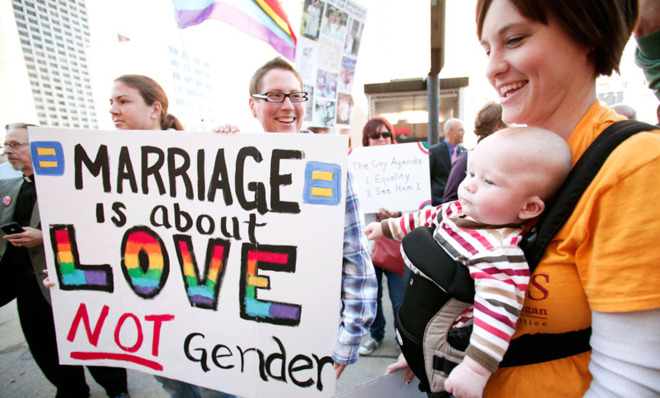
A free daily email with the biggest news stories of the day – and the best features from TheWeek.com
You are now subscribed
Your newsletter sign-up was successful
New Jersey just became the 14th state to legalize gay marriage. This is a development that would have seemed impossible just a few years ago.
Consider this: A Washington Post/ABC News poll earlier this year showed that 58 percent of Americans approve legalizing gay marriage and only 36 percent oppose it. In 2003, it was the reverse: 37 percent favored same-sex marriage and 55 percent opposed it. How did we get here? Let's take a trip down memory lane...
October 15, 1971
The Week
Escape your echo chamber. Get the facts behind the news, plus analysis from multiple perspectives.

Sign up for The Week's Free Newsletters
From our morning news briefing to a weekly Good News Newsletter, get the best of The Week delivered directly to your inbox.
From our morning news briefing to a weekly Good News Newsletter, get the best of The Week delivered directly to your inbox.
Jack Baker and his partner James Michael McConnell are the first gay couple in the country to apply and sue for the right to get married. The Minnesota Supreme Court rules that marriage is "a union of man and woman, uniquely involving the procreation and rearing of children within a family." The U.S. Supreme Court refuses to hear the case.
1977
Gallup doesn't ask whether people approve of gay marriage — it asks, "Do you think homosexual relations between consenting adults should or should not be legal?" A full 43 percent of those polled say no.
1988
A free daily email with the biggest news stories of the day – and the best features from TheWeek.com
Despite the birth of National Coming Out Day, only 11 percent of Americans support same-sex marriage, according to polling data from the University of Chicago.
May 7, 1993
Hawaii takes a step toward legalizing gay marriage when the state Supreme Court rules that a ban on same-sex marriages might violate the state constitution. Opponents later get around the decision by passing a "defense of marriage" constitutional amendment in 1998.
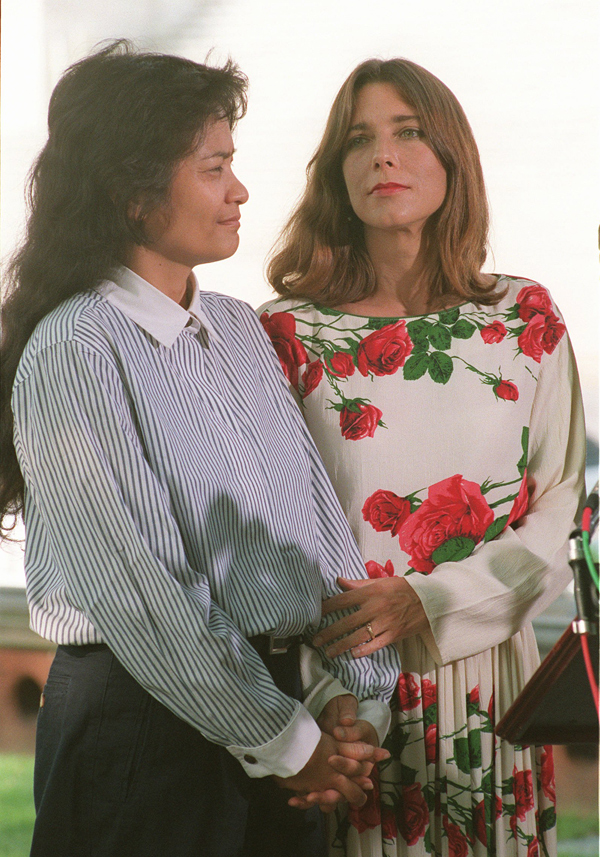
Genora Dancel (left) and Ninia Baehr, plaintiffs in a Hawaiian anti-gay-marriage case, in 1996. (AP Photo/Dennis Cook)
March 1, 1995
Utah Gov. Mike Leavitt signs the Defense of Marriage statute to "deny recognition to marriages performed elsewhere that do not conform to Utah law." That includes same-sex marriages.
1996
Only 27 percent of those polled say gay marriage should be legal.
September 21, 1996
President Bill Clinton signs the Defense of Marriage Act, defining marriage as between a man and a woman.
December 20, 1999
The Vermont Supreme Court rules in Baker v. Vermont that same-sex couples are entitled to the same rights as heterosexual couples.
April 25, 2000
The Vermont House of Representatives passes a bill to allow gay and lesbian couples to form civil unions.
2003
An ABC News/Washington Post poll shows that support for gay marriage is up to 37 percent.
November 18, 2003
In a 4-3 decision, the Massachusetts Supreme Judicial Court rules that the state cannot "deny the protections, benefits, and obligations conferred by civil marriage to two individuals of the same sex who wish to marry."
February 12, 2004
Mayor Gavin Newsom demands that the San Francisco city clerk issue marriage licenses to same-sex couples. In August, the California Supreme Court rules that he exceeded his authority and voids 3,955 marriages.
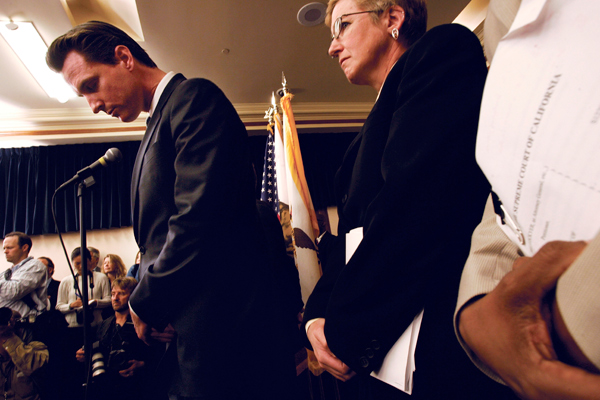
San Francisco Mayor Gavin Newsom speaks during a press conference after the California Supreme Court invalidates same-sex marriages. (David Paul Morris/Getty Images)
February 24, 2004
President George W. Bush backs a constitutional amendment that would ban gay marriage. "Marriage cannot be severed from its cultural, religious, and natural roots without weakening the good influence of society," the president says.
February 28, 2004
Jason West, mayor of New Paltz, N.Y., follows Gavin Newsom's lead by solemnizing gay marriages outside of city hall. The state Supreme Court later issues a restraining order barring him and other village trustees from conducting same-sex marriages.
May 17, 2004
Marcia Kadish and Tanya McCloskey, after being together for 18 years, become the first gay couple to get legally married in the United States, at Cambridge City Hall in Massachusetts.
November 2, 2004
Gay rights activists take a "right hook to the chin" as 11 states — Arkansas, Georgia, Kentucky, Michigan, Mississippi, Montana, North Dakota, Oklahoma, Ohio, Oregon, and Utah — pass bans on same-sex marriage.
September 7, 2005
The California Assembly passes a bill allowing same-sex marriages. Later that month, Gov. Arnold Schwarzenegger vetoes the legislation.
November 7, 2006
Gay-marriage bans pass in seven states, but Arizona voters reject Proposition 107, a constitutional amendment that would have strengthened the state's existing laws banning same-sex marriage.
July 31, 2008
Gov. Deval Patrick clears the way for same-sex couples from other states to get married in Massachusetts by repealing a 95-year-old statute that "barred out-of-state residents from marrying here if the marriage would be considered void in their home state." The legislation was originally meant to prevent interracial marriage.
October 8, 2008
Connecticut legalizes gay marriage thanks to a 4-3 state Supreme Court ruling that says that an existing law banning same-sex marriage "failed to establish adequate reason to justify the statutory ban."
November 4, 2008
Proposition 8, which defines marriage as between a man and a woman, is passed by 52.1 percent of voters in California. Estimates put the amount spent on campaigns for and against the proposition at $72 million.
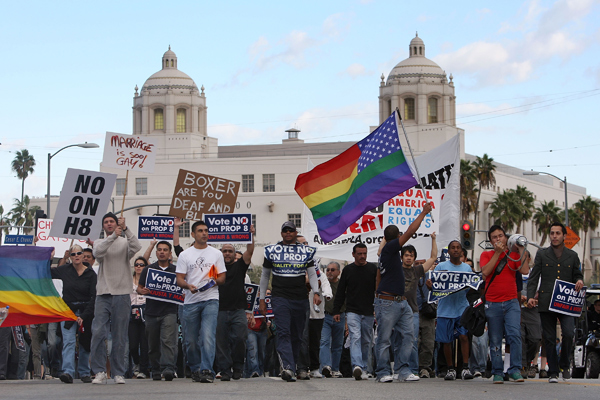
Supporters of same-sex marriage rally to overturn Proposition 8 on November 9, 2008. (David McNew/Getty Images)
April 3, 2009
The Iowa Supreme Court rules that a 10-year-old ban on same-sex marriage "treated gay and lesbian couples unequally under the law," making the state the first in the Midwest to allow gay marriage.
April 7, 2009
The Vermont legislature overrides Gov. Jim Douglas' veto and makes gay marriage legal.
May 6, 2009
Lawmakers in New Hampshire and Maine pass bills in favor of same-sex marriage. In November, 53 percent of voters in Maine repeal the new law and make gay marriage illegal again. New Hampshire officially legalizes gay marriage in June 2009.
December 15, 2009
Washington, D.C., lawmakers legalize gay marriage.
December 22, 2010
After repealing the "don't ask, don't tell" law preventing openly gay men and women from serving in the military, President Obama tells ABC News' Jake Tapper that his "feelings are constantly evolving" on gay marriage.
June 24, 2011
A bill legalizing gay marriage squeezes through the Republican-led New York State Senate by a vote of 33-29. Gov. Andrew Cuomo signs the bill into law, doubling the number of Americans who live in states that allow same-sex marriage.
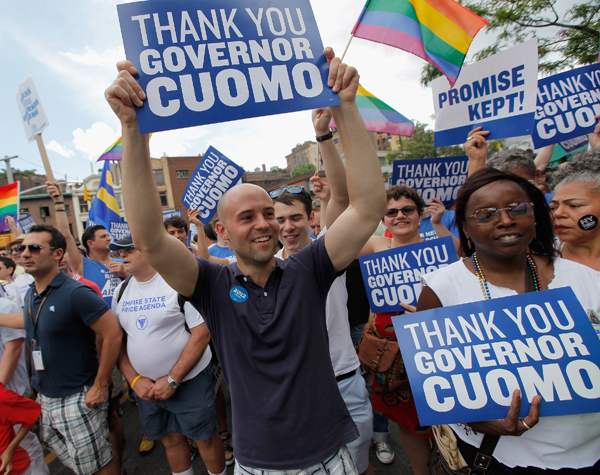
Revelers hold signs on June 26, 2011, thanking Gov. Andrew Cuomo for keeping his campaign promise and legalizing same-sex marriage. (Jemal Countess/Getty Images)
October 1, 2011
The Pentagon allows military chaplains to perform same-sex marriages as long as they aren't at official Defense Department events and don't violate local laws.
February 17, 2012
Gov. Chris Christie vetoes a gay marriage bill in New Jersey and asks the legislature to "trust the people of New Jersey and seek their input by allowing our citizens to vote on a question that represents a profoundly significant societal change."
May 8, 2012
North Carolina passes an amendment that says "marriage between one man and one woman is the only domestic legal union that shall be valid or recognized in this state."
May 9, 2012
President Obama becomes the first president to say that "same sex couples should be able to get married," although he disappoints gay rights activists by saying the issue should still be decided by the states.
November 6, 2012
For the first time ever, gay marriage is legalized by popular vote. The American Civil Liberties Union calls the passing of measures in Maryland, Maine, and Washington state a "watershed moment" for gay rights in America. In Minnesota, a constitutional amendment that would have defined marriage as between a man and a woman fails to pass.
March 8, 2013
Bill Clinton writes an op-ed in The Washington Post saying that he regrets signing DOMA into law and now finds it "incompatible with our Constitution."
March 15, 2013
Sen. Rob Portman (R-Ohio) breaks with many in his party by declaring his support for gay marriage, saying that he changed his mind because his 21-year-old son is gay.
March 18, 2013
Hillary Clinton fuels rumors that she will run for president in 2016 by releasing a six-minute video announcing her support for gay marriage — a stance that is increasingly in the mainstream of American politics.
March 18, 2013
It's official: More Americans now support legalizing gay marriage than oppose it.
May 2, 2013
Rhode Island Gov. Lincoln Chafee signs a bill legalizing same-sex marriage in Rhode Island, the 10th state to do so.
May 7, 2013
"Delaware should be, is and will be a welcoming place to live and love and to raise a family for all who call our great state home," says Democratic Gov. Jack Markell as he signs a bill making Delaware the 11th state in the country to legalize same-sex marriage.
May 14, 2013
Minnesota becomes the 12th state to legalize gay marriage.
June 26, 2013
The Supreme Court rules 5-4 that DOMA is unconstitutional, allowing same-sex couples to collect tax, health, and retirement benefits from the federal government. It also dismisses a Proposition 8 appeal, clearing the way for gay marriage to resume in California.
October 21, 2013
Same-sex marriage officially becomes legal in New Jersey, and gay couples begin exchanging vows in several Garden State communities. The office of Republican Gov. Chris Christie also drops its appeal of the court decision recognizing gay marriage.
This article was originally published on March 20, 2013, and last updated on October 21, 2013.
Sources: ABC News (2), Associated Press (2), Boston Globe (2), Cleveland Plain Dealer, CNN (2)(3)(4)(5), Des Moines Register, Fox News, Gallup, Houston Chronicle, Huffington Post (2), Minnesota Post, Mother Jones, NBC News (2), New York Times (2)(3), NPR, Politico (2), Reuters (2), San Francisco Gate (2)(3)(4), Sports Illustrated, University of Chicago, USA Today, Wall Street Journal (2), Washington Post (2)(3)(4)
Keith Wagstaff is a staff writer at TheWeek.com covering politics and current events. He has previously written for such publications as TIME, Details, VICE, and the Village Voice.
-
 Political cartoons for February 15
Political cartoons for February 15Cartoons Sunday's political cartoons include political ventriloquism, Europe in the middle, and more
-
 The broken water companies failing England and Wales
The broken water companies failing England and WalesExplainer With rising bills, deteriorating river health and a lack of investment, regulators face an uphill battle to stabilise the industry
-
 A thrilling foodie city in northern Japan
A thrilling foodie city in northern JapanThe Week Recommends The food scene here is ‘unspoilt’ and ‘fun’